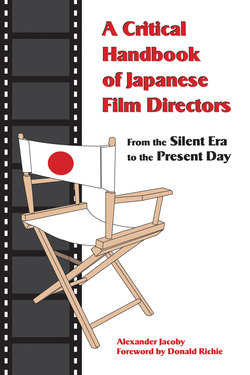Читать книгу A Critical Handbook of Japanese Film Directors - Alexander Jacoby - Страница 30
На сайте Литреса книга снята с продажи.
HIRAYAMA Hideyuki
Оглавление(b. September 18, 1950)
平山秀幸
Hirayama has sustained parallel careers as a proficient craftsman of big-budget commercial entertainments and as an artist realizing small-scale, offbeat, and imaginative projects. After a long freelance apprenticeship to such directors as Jūzō Itami and Kichitarō Negishi, he made his debut, a comic horror film, for the Directors’ Company. Lighthearted horror continued to occupy him through much of the nineties, as he directed three installments of the popular Haunted School (Gakkō no kaidan) series, a sub-Spielberg exercise in thrills and spills for kids, with endearingly inept special effects. By this time, however, he had achieved critical notice with The Games Teachers Play (Za chūgakkō kyōshi, 1992), about a junior high school teacher trying to deal with delinquency by encouraging his charges to dispense their own justice. Mark Schilling praised the film’s “clear-eyed view of [the] teenage world, minus adult romanticizing, caricaturing, and demonizing.” Also well-received during the nineties was Begging for Love (Ai o kou hito, 1998), an account of a girl suffering abuse at the hands of her mother, which fixed its story in the context of the social instability of Japan after World War II.
Since the millennium, Hirayama has won further acclaim for two remarkable black comedies. The Laughing Frog (Warau kaeru, 2002) was a droll, dry satire with a faintly Bunuelian touch to its cynical portrait of bourgeois life, the black sheep husband ultimately proving the most sympathetic figure among the venal and selfish, if respectable, characters who surround him. Hirayama’s precise framing, using a mainly static camera, observed the unfolding comedy with neither indulgence nor contempt, and the performances were superb. Out (2002) focused on a middle-aged woman who murders her husband and conspires with her colleagues at a boxed lunch factory to dispose of the body. Despite the melodramatic premise, its theme was the ordinary frustrations of female experience in a patriarchal society.
Hirayama has continued to work in a variety of genres. Turn (Tān, 2001) was an engaging fantasy in which a woman finds herself doomed, after a car crash, to relive endlessly the same 24 hours in a parallel universe of which she appears to be the only inhabitant. Especially in the early stages, Hirayama intelligently dramatized the reactions of his heroine to her isolation, and the film was rather touching. Lady Joker (Redī Jōkā, 2004) used a thriller plot about a plan to kidnap a company president to launch an investigation into corruption in Japanese society. Samurai Resurrection (Makai tenshō, 2003), however, was a more purely commercial work: a large, dumb action movie which submerged story and characterization under a barrage of special effects. Still, while Hirayama remains an uneven director, he has been responsible for some of the more original and diverting Japanese films of recent years. In 2007, two films inspired by the style and tradition of rakugo comic storytelling confirmed his versatility: Talk, Talk, Talk (Shaberedomo shaberedomo) was a story about a modern practitioner of this old-fashioned art form training three reluctant recruits for a performance, while Three for the Road (Yajikita dōchū: Teresuko) was a lighthearted road movie reworking the oft-filmed eighteenth-century novel Shank’s Mare (Hizakurige).
1990 Maria no ibukuro / Maria’s Stomach
1992 Za chūgaku kyōshi / The Games Teachers Play (lit. The Junior High School Teacher)
1993 Ningen kōsaten: Ame / Human Crossroads: Rain
1994 Yoi ko to asobō / Let’s Play with the Good Children
1995 Gakkō no kaidan / Haunted School
1996 Gakkō no kaidan 2 / Haunted School 2
1998 Ai o kou hito / Begging for Love
1999 Gakkō no kaidan 4 / Haunted School 4
2001 Tān / Turn
2002 Warau kaeru / The Laughing Frog
Out
2003 Makai tenshō / Samurai Resurrection
2004 Redī Jōkā / Lady Joker
2007 Shaberedomo shaberedomo / Talk, Talk, Talk
Yajikita dōchū: Teresuko / Three for the Road
